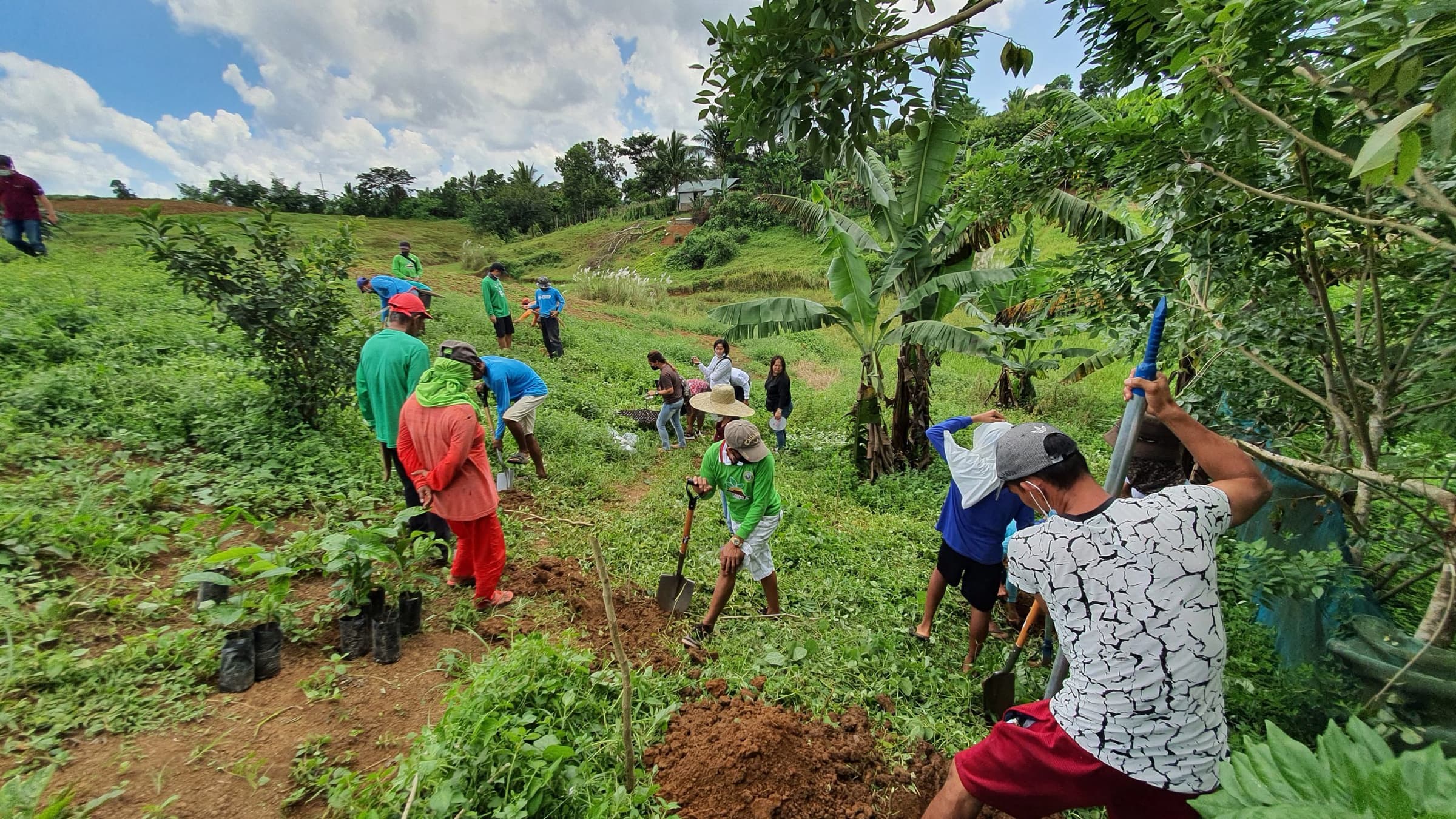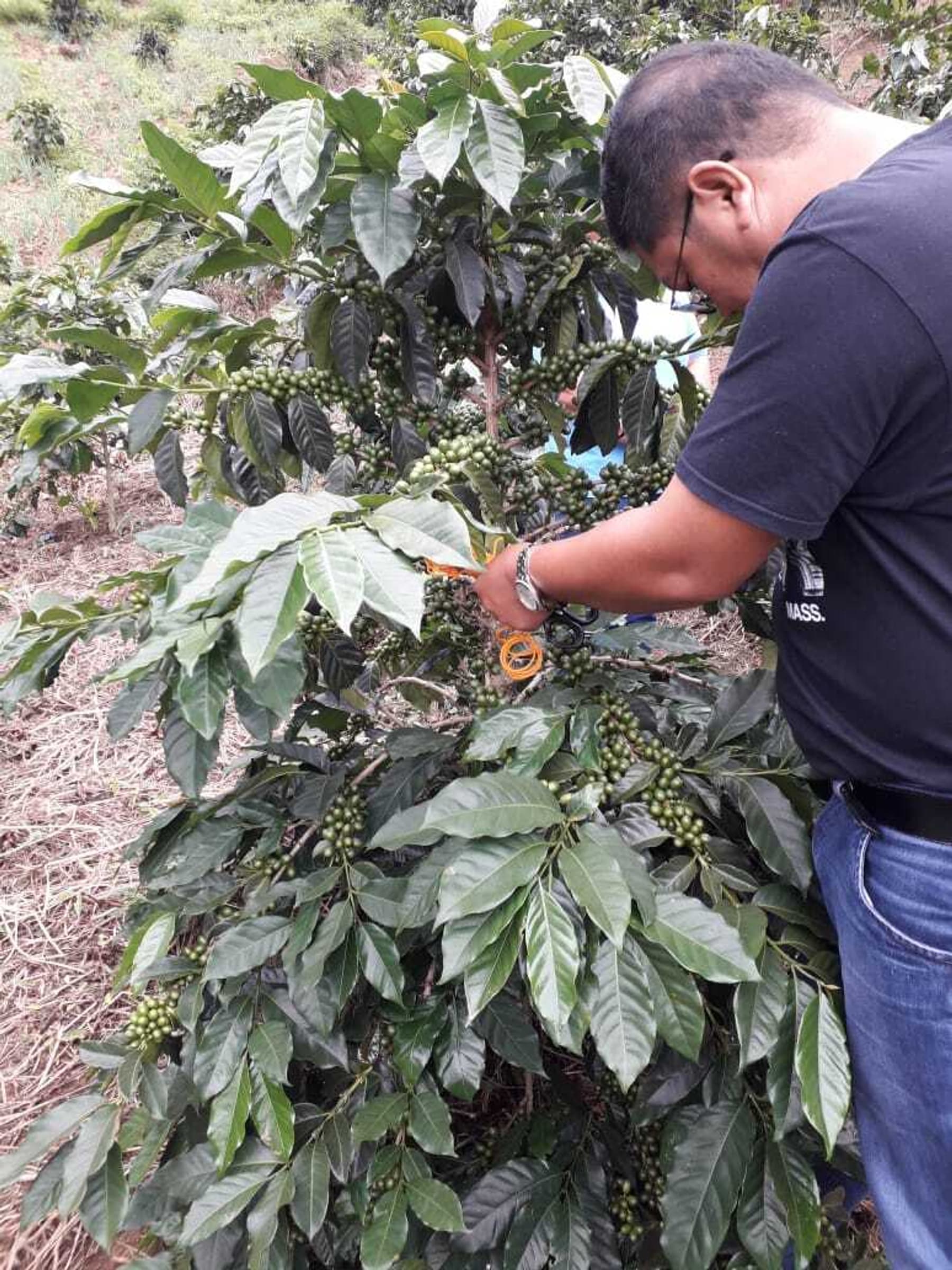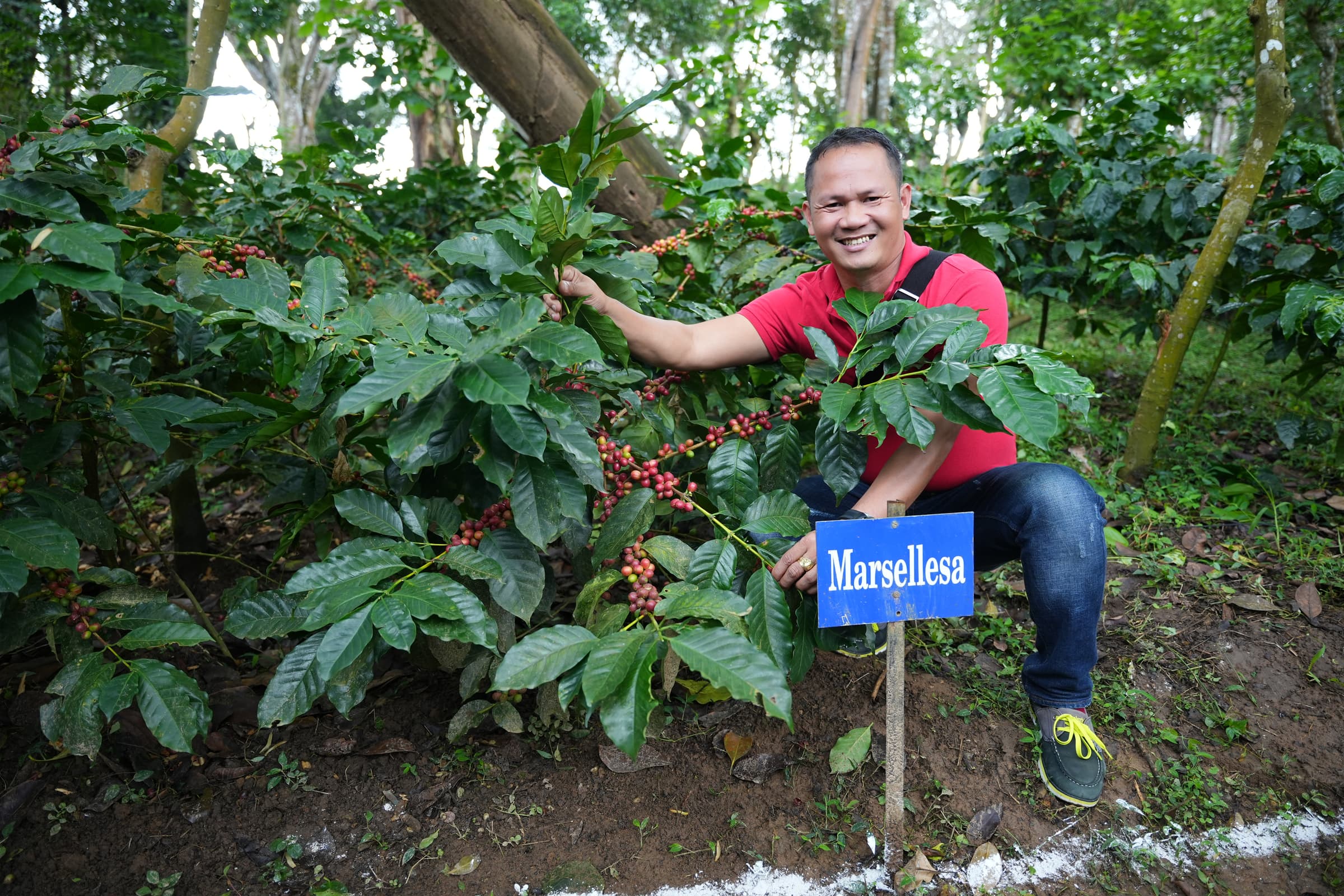PhilCAFE project concludes, leads evolution of the Philippine coffee industry
Celebrating the progress made through the five-year, USDA-funded project implemented by ACDI/VOCA in partnership with WCR, including the first legal introduction of arabica varieties to the Philippines

Coffee farmers in the Laguna Province of the Philippines applying skills learned during a PhilCAFE training on good agricultural practices, 2021. Photo by ACDI/VOCA.
September 2023 marked the conclusion of the five-year Philippine Coffee Advancement and Farm Enterprise (PhilCAFE) project, originally launched in 2019 to support 13,700 coffee farmers country-wide. Funded by the United States Department of Agriculture (USDA) and Implemented by ACDI/VOCA in partnership with World Coffee Research (WCR), the PhilCAFE project paved the way for innovation in the Philippine coffee industry through activities centered on improving coffee production and quality, empowering farmers, and supporting skills development for the nation’s researchers and producers.
Throughout its engagement in the project, WCR led a variety of these activities and initiatives, hosting several field trials, training sessions, learning experiences, and research opportunities all aimed at increasing scientific knowledge and the capacity of the coffee research sector in the Philippines. “This project was designed and started prior to the global COVID pandemic. We had to adapt and change the project in response to what could be safely done,” said Dr. Kraig Kraft, WCR’s Asia and Africa Director, “I’m quite pleased with what we have done in this project. We have the first legal introduction of new arabica coffee varieties to the Philippines, we’ve supported graduate students with their coffee-related research and improved the quality of nurseries in the Philippines—these are all important outcomes from this project.”
Evaluating and introducing varieties in the field
WCR’s engagement included the installation of 18 national On-Farm Technology Trial (OFTT) and 2 variety trial sites, both of which remain ongoing in partnership with government agencies, cooperatives, and farmers continuing the management of data collection and analysis.
The variety trial sites, which focus on the introduction and evaluation of numerous high-performing varieties developed outside the Philippines, have provided opportunities for Philippine coffee growers and the industry to access new, high-yielding, climate-resilient, and pest and disease-resistant varieties. “The Philippine Coffee industry needs this kind of project as production of coffee is declining,” said Melani Provido, Chief Researcher of the Department of Agriculture for Region XI in the Philippines, “Climate change has a lot to do with the decline and we need new varieties that can adapt to be able to sustain production and provide income to our farmers.”

The establishment of the variety trial sites in the Luzon and Mindanao areas marks the first legal introduction of coffee varieties to the Philippines through a partnership with Mountain Province Polytechnic College and the Department of Agriculture Region 11 Research Division. These varieties, which hail from other coffee-producing countries such as Rwanda, Kenya, Brazil, and Panama, are being tested under the climatic conditions of the Philippine growing regions to determine their potential vigor, yield, and cup quality. “There is a strong coffee industry in the Davao Region that is eager to plant potential varieties once they’re commercially released,” said Provido, “With new varieties being introduced and tested in farmers field, the Department of Agriculture can facilitate the registration of potential varieties to the National Seed Industry Council.”
The OFTTs, installed to evaluate the performance of the country’s existing varieties against different, innovative agronomic treatment methods to increase farmer profitability, have helped identify the best-performing, currently available varieties for specific locations. As a part of this trial, the Sultan Kudarat State University (SKSU) Research and Extension division, in collaboration with the PhilCAFE project, aimed to disseminate exemplary farming practices to local coffee cooperators with the goal of increased production and coffee quality. With this, a specialized nursery was established and managed by a farmer cooperator in Kinilis, Polomolok, and seeds obtained from the OFTT sites were successfully germinated and cultivated, resulting in the planting of 1,300 Catimor seedlings during the initial harvest—a major testament to the effectiveness and success of the applied techniques.

Supporting seed sector development
WCR continues its commitment to working with partners worldwide to assess the state of their seed sectors, address any existing challenges, and reduce the barriers to accessing healthy, high-performing plants as a part of its seed sector evaluation program. Throughout its engagement in the PhilCAFE project, WCR identified the need for improvement in the Philippine seed sector certification process and provided support to optimize the country’s system for effective seed lot management.
For instance, in 2022, WCR facilitated two rounds of training sessions on the Bureau of Plant Industry (BPI) nursery and mother plant garden accreditation and seed lot management training with BPI National Seed Quality Control Services (NSQCS) at the Department of Agriculture Cordillera Administrative Region (DA-CAR) in Baguio City and at the Agroforestry Coffee Development Center (ACDC) in Kapatagan Digos City respectively. Seventy-one attendees from producer organizations participated in the trainings and learned about standard procedures, practices, and requirements for seed lot management to produce genetically pure planting material. They also gained a greater understanding of the requirements and procedures of BPI’s accreditation process for nurseries and the technical support available to cooperative and producer organizations throughout the accreditation process.
In addition, in the summer of 2023, to improve the traceability of coffee varieties, WCR coordinated DNA genotyping of plants at BPI Baguio to gain clarity on their genetic origins. A total of 282 leaf samples comprising sweet coffee in Bukidnon and BPI Baguio-certified arabica varieties were shipped to Intertek Laboratory in Sweden for genetic testing using WCR’s low-density panel of KASP markers for arabica. The results will soon be shared with partner stakeholders, along with WCR-recommended practices and protocols for seed lot management.
Empowering researchers and expanding capacity for innovation
Supporting national partners in building capacity to undertake innovative research & development (R&D) is a key part of WCR’s work, and through the PhilCAFE project, the organization directly empowered researchers in the Philippines to do just that. In 2022, WCR announced the winners of six research grants awarded on behalf of PhilCAFE, which provided funding support to researchers at local state universities to conduct projects on topics they saw as critical to furthering coffee R&D in the country. During their grant period, all recipients produced theses, dissertations, and research products for introduction to the Philippine coffee research community, and four out of six of the awardees had the opportunity to present their research at the 2023 Philippine Coffee Expo.
Further, over the past few years, WCR hosted several learning experiences for PhilCAFE researchers and the ACDI/VOCA staff. These experiences—which included trips to Karnataka, India, the Pacific Northwestern United States, and the central highlands of Vietnam—focused on allowing researchers to observe agricultural research and production systems worldwide and participate in the global scientific forum through events like the Specialty Coffee Association (SCA) Expo and the Association for Science and Information on Coffee (ASIC) conference.

Allan Datu-Imam, a PhilCAFE technical advisor, poses in front of the variety Marsellesa at the Central Coffee Research Institute’s IMLVT plot site in Balehonnur, Karnataka, India.
For example, Jermaine Marie Ann O. Fabella, a researcher at Cavite State University, was able to present her research on the genetic differentiation of Coffea liberica using SSR marker analysis at the ASIC conference in September. “It was a privilege to meet and learn from different scientists and researchers from all over the world,” said Fabella, “The conference helped me deepen my knowledge as a researcher, exposed me to the latest research and innovation, and helped me boost my motivation and confidence in conducting my research.”
The future of Philippine coffee
“There are a lot of smaller arabica producing countries that have similar challenges as the Philippines. With no local breeding program, there are no new varieties that will be available that meet the market demands, nor be adapted to the demands of climate change,” says Dr. Kraft, “What the PhilCAFE project has accomplished helps take the best bets from other countries and see what works well under these conditions, while simultaneously building the capacity of the local researchers to take on these larger questions of how to best support and develop the Philippine coffee sector.”
The accomplishments and successes outlined above only capture a small portion of the progress made throughout the project’s lifespan and represent just the start of a better future for coffee farmers and industry professionals in the country. The purpose of this project will persist through the local management of initiatives by cooperatives, producer organizations, and government agencies dedicated to creating a more sustainable landscape for coffee in the Philippines.